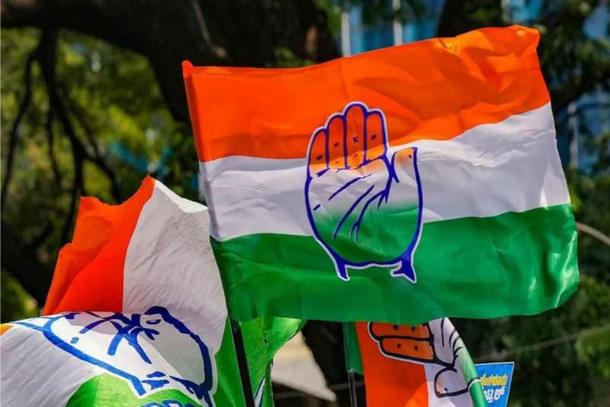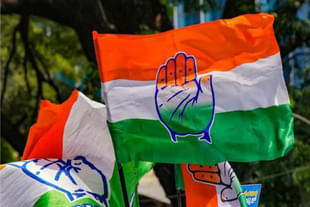Commentary
When Crisis Strikes, Congress Goes Missing
Shivansh
May 19, 2025, 05:55 PM | Updated 05:55 PM IST
Save & read from anywhere!
Bookmark stories for easy access on any device or the Swarajya app.


Congress Fades From Bharat’s Fight
In the wake of the April 2025 Pahalgam terror attack and the resolute response of Operation Sindoor, India stands united against the shadow of terrorism. Yet, one voice which remains conspicuously absent from the national discourse is the Indian National Congress. Once a towering force in India’s political landscape, the Congress has faded into irrelevance during this national security crisis, its silence not just a tactical misstep but a profound cultural and ideological disconnect from the nation’s pulse. Unlike past crises such as Mumbai’s 26/11 in 2008, where opposition leaders like L K Advani and Narendra Modi commanded attention, today’s Congress is a ghost in the public consciousness, its ineffectiveness a self-inflicted wound that betrays its legacy.
During the 1999 Kargil War, the media hung on Atal Bihari Vajpayee’s words, but Congress leaders like Sonia Gandhi were also sought for their views, reflecting the party’s relevance as a moral counterweight. In 2008, after the 26/11 Mumbai attacks, L K Advani rallied the nation with his Lok Sabha call for unity and resolute action against terrorism, while Narendra Modi captured national attention by meeting victims and proposing robust anti-terror solutions in his press conference, amplifying the opposition’s role in shaping national resolve. Contrast this with 2025, the Pahalgam attack, which claimed 26 lives, and Operation Sindoor, targeting terror camps in Pakistan and Pakistan-occupied Kashmir (PoK), have seen no Congress figure, neither Mallikarjun Kharge nor Rahul Gandhi, capturing the public imagination.
Articulate leaders like Shashi Tharoor, capable of projecting a powerful national voice, are sidelined by Congress’ dynastic leadership, as evident in their omission of him from the four members of parliament (MPs) nominated for central government's all-party delegation. As Leader of the Opposition, Congress fails to platform its own talent, leaving the Bharatiya Janata Party (BJP) to unite the nation by including opposition voices like Tharoor and Asaduddin Owaisi in delegations to expose Pakistan’s terrorism globally. The party’s absence is not merely a media oversight; it is a symptom of its failure to resonate with a nation that craves decisive, culturally rooted leadership in times of crisis.
Cultural and Digital Disconnect
What makes Congress’ irrelevance unique today is its self-imposed exile from the spirit of modern India. The party, once a champion of Nehruvian secularism, has failed to evolve its narrative to align with the assertive nationalism that defines modern India. When terror strikes, the public seeks leaders who embody Bharat’s civilisational resolve, figures like Modi, whose “attack terrorists in their backyards” doctrine galvanises the nation. Congress, swamped in outdated rhetoric, offers no such vision. Its tepid response to Pahalgam, marked by Kharge’s vague allegations of intelligence failures and Ajay Rai’s juvenile toy airplane stunt, was not just ineffective but out of touch with cultural sentiments, distancing itself from a populace that prioritises strength over rhetoric.
This cultural disconnect is compounded by Congress’ inability to harness the digital battlefield. In 2025, public consciousness is shaped on platforms like X, where narratives of national pride and military valour dominate. BJP leaders like Tejasvi Surya and Sudhanshu Trivedi have mastered this space, framing Operation Sindoor as a triumph of India’s sovereignty. Congress, by contrast, is a digital non-entity, its deleted “Gayab” post mocking Modi’s leadership a fleeting embarrassment that failed to trend. Unlike Advani’s 2008 speeches, which resonated through print and television (TV), or Modi’s 2008 Gujarat model, which became a national talking point, Congress’ 2025 interventions are footnotes, drowned out by the BJP’s narrative dominance and the public’s disinterest.
The party’s irrelevance also stems from its moral abdication. In past crises, opposition leaders offered constructive dissent, such as Advani’s call for a robust anti-terror framework in 2008 or Vajpayee’s measured critique during the 1993 Mumbai blasts. Congress in 2025, however, has no moral compass to offer. Its leaders neither inspire unity nor challenge the government with substantive alternatives. When Kharge cited an unnamed newspaper to question intelligence lapses, he offered no vision for counter-terrorism, no call to strengthen the National Intelligence Agency (NIA) or reform intelligence-sharing. This vacuum ensures that Congress is not just ignored but deemed irrelevant by a nation that demands actionable patriotism during crises.
Alienating India’s Youth
Perhaps the most damning aspect of Congress’ vanishing act is its failure to represent India’s youth, who form the backbone of the nation’s crisis consciousness. In 1999 and 2008, opposition voices resonated with young Indians, who saw in leaders like Advani and Modi a reflection of their aspirations for a secure, assertive India.
Young leaders like Jyotiraditya Scindia have abandoned Congress, repelled by its dynastic stagnation and failure to embrace the nationalist zeal that inspires India’s youth. Today's youth, vocal on X and energised by Operation Sindoor’s success, see no such reflection in Congress. Rahul Gandhi’s absence from the Pahalgam discourse and Priyanka Gandhi’s silence on Operation Sindoor underscore a generational disconnect. The party’s inability to craft a narrative that speaks to this demographic consigns it to obscurity, as young India rallies behind the BJP’s vision of a terror-free Bharat.
A Betrayal of Legacy
Congress’ irrelevance is not merely a political failure but a betrayal of its own history. The party that once led India to independence should, in theory, be a moral force in times of crisis. Yet, its actions, or lack thereof, reveal a deeper truth: Congress has drifted far from the Bharat it once shaped, betraying its own roots. By failing to engage with India’s cultural, digital, and moral landscape, it has rendered itself a bystander in the face of terror. As Operation Sindoor reaffirms India’s resolve, the Congress stands as a cautionary tale, a party that could have been a voice of Bharat but chose instead to fade into the shadows of irrelevance.





